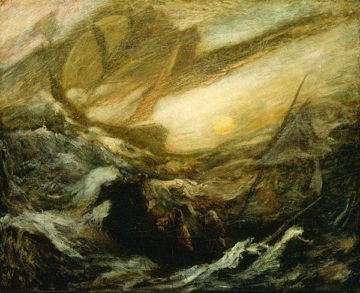Andrew L. Shea at The New Criterion:
 In one of his only published comments on art, a 1905 treatise titled “Paragraphs from the Studio of a Recluse,” the American painter Albert Pinkham Ryder (1847–1917) wrote that “the artist needs but a roof, a crust of bread, and his easel, and all the rest God gives him in abundance.” Ryder continued: “He must live to paint and not paint to live. He cannot be a good fellow; he is rarely a wealthy man, and upon the potboiler is inscribed the epitaph of his art.” A quarter-century later, Virginia Woolf struck a similar note when she famously argued that a woman wanting to write fiction requires just two things: enough money to get by on, and a “room of one’s own.” In context, the two essays aren’t at all alike: Woolf’s broader argument is about making space for women in the literary tradition, whereas Ryder offers a personal defense of thrift and simplicity. Shared by both, however, is the understanding that isolation is a positive and essential—perhaps the essential—condition for artistic creation. A room “of one’s own,” that is—the studio of a recluse.
In one of his only published comments on art, a 1905 treatise titled “Paragraphs from the Studio of a Recluse,” the American painter Albert Pinkham Ryder (1847–1917) wrote that “the artist needs but a roof, a crust of bread, and his easel, and all the rest God gives him in abundance.” Ryder continued: “He must live to paint and not paint to live. He cannot be a good fellow; he is rarely a wealthy man, and upon the potboiler is inscribed the epitaph of his art.” A quarter-century later, Virginia Woolf struck a similar note when she famously argued that a woman wanting to write fiction requires just two things: enough money to get by on, and a “room of one’s own.” In context, the two essays aren’t at all alike: Woolf’s broader argument is about making space for women in the literary tradition, whereas Ryder offers a personal defense of thrift and simplicity. Shared by both, however, is the understanding that isolation is a positive and essential—perhaps the essential—condition for artistic creation. A room “of one’s own,” that is—the studio of a recluse.
more here.
